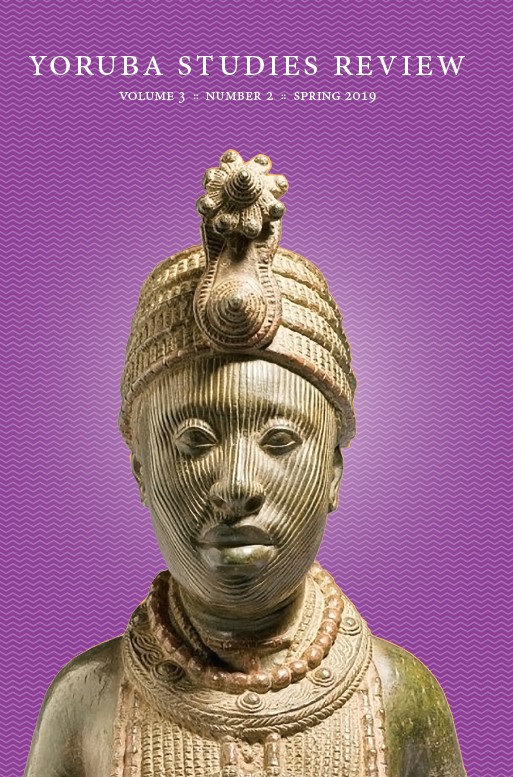Abstract
Let us begin with an unfortunate fact: Adébáyọ̀ Fálétí is one major writer that is hardly anthologized. The problem could not have been that he wrote in Yorùbá because Fágúnwà is far more anthologized than he is. Simon Gikandi’s edited Encyclopedia of African Literature (2003) has an entry and other multiple references to Fágúnwà. There is only one reference to Fálétí which is found in the index without any accompanying instance in the work. In Irele and Gikandi’s edited volumes, The Cambridge History of African and Caribbean Literature (2004), Fálétí only managed an appearance in the bibliography that featured four of his works—Wọn Rò Pé Wèrè Ni ́ (1965), Ọmọ Olókùn Ẹṣin (1969), Baṣòrun Gáà (1972) and Ìdààmú Páàdì Mínkáílù (1974). In the preface, Irele and Gikandi write: The scholarly interest in African orality also drew attention to the considerable body of literature in the African languages that had come into existence as a consequence of the reduction of these languages to writing, one of the enduring effects of Christian evangelization. The ancient tradition of Ethiopian literature in Ge’ez, and modern works like Thomas Mofolo’s Shaka in the Sotho language, and the series of Yorùbá novels by D. O. Fágúnwà, were thus able finally to receive the consideration they deserved. African-language literatures came to be regarded as a distinct province of the general landscape of imaginative life and literary activity on the African continent (2004, xiii). Essays 60 Adeshina Afolayan In fact, the publication of Fágúnwà’s Ògbójù Ọdẹ Nínú Igbó Ìrúnmalẹ (The ̀ Intrepid Hunter in the Forest of Spirits, 1938) made the chronology of literary events in Africa, and it misses out Fálétí’s 1965 work. In her “Literature in Yorùbá: poetry and prose; traveling theater and modern drama,” in the same volume, Karin Barber seems to redress this imbalance when she gives a place to Fálétí in her discussion of post-Fágúnwà writers. According to her, In the late 1960s and throughout the 1970s there was an explosion of literary creativity, with many new authors emerging and pioneering new styles and themes. Among the most prominent were Adébáyọ Fálétí whose ̀ Ọmọ Olókùn Ẹṣin (1969) is a historical novel dealing with a revolt against the overlordship of Ọyọ, and Ọládèjọ Òkédìjí, author of two brilliantly innovative crime thrillers (Àjà ló lẹrù, 1969, and Àgbàlagbà Akàn, 1971), as well as a more somber tragic novel of the destruction of a young boy who is relentlessly drawn into a life of crime in the underworld of Ifẹ (Atótó Arére, 1981). Notable also are Akínwùnmí Ìsòlá, whose university campus novel Ó le kú (1974) broke new ground in social setting and ambience; Afọlábí Ọlábímtán, author of several novels, including Kékeré Ẹkùn (1967), which deals with the conflicts arising from early Christian conversion in a small village, and Baba Rere! (1978), a contemporary satire on a corrupt big man; and Kólá Akínlàdé, prolific author of well-crafted detective stories such as Ta ló pa Ọmọ Ọba? (Who Killed the Prince’s Child?). These authors were all verbal stylists of a high order; they transformed the literary language, moving away from Fágúnwà’s rolling cadences to a more demotic, supple prose that successfully caught the accents of everyday life (2004, 368). While it may be misplaced to draw a comparison between Fágúnwà and Fálétí, there is a sense in which Fálétí’s demonstrates a more robust literary sensibility that goes beyond the allegorical into a realistic assessment of human relationship and sociality within the context of the Yorùbá cultural template. While Fágúnwà could not resist the influence of Christianity, and especially the allegorical motif of the journey in which humans encounter spiritual challenges (which John Bunyan’s Pilgrim Progress made popular), Fálétí is fundamentally a cultural connoisseur; a writer with a most intimate and dynamic understanding of the Yorùbá condition, especially in its conjunction with the political and sociocultural contexts of contemporary Nigeria. And we have Ọlátúndé Ọlátúnjí to thank for the deep exploration and interrogation of the fundamental poetic and literary nuances that Fálétí has left for us. In this essay, I will attempt to unearth the philosophical sensibility that undergirds Fálétí’s literary prowess, especially as demonstrated by his poems. Fálétí’s Philosophical Sensibility 61 Both the poets and the philosophers have always had one thing in common— the exploration of the possibilities that ideas and visions yield: As theoretical disciplines concerned with raising social consciousness, philosophy and literature engage in similar speculation about the good society and what is good for humanity. They influence thoughts about political currents and conditions. They can, for instance, lead the reader to critical reflections on the type of leaders suitable for a given society and on the degree of civic consciousness exercised by the people in protecting their rights. Philosophy and literature, equally, offer critical evaluation of existing and possible forms of political arrangements, beliefs and practices. In addition, they provide insights into political concepts and justification for normative judgements about politics and society. They also create awareness of possibilities for change (Okolo 2007, 1). Compared to Ọlátúnjí’s exploratory unraveling of Fálétí’s poetry, my objective is to enlist Fálétí as a poet that has not been given his due as one who is sensitive to the requirements of political philosophy and its objective of ensuring the imagination of a society that is properly ordered according to the imperatives of justice.

This work is licensed under a Creative Commons Attribution-NonCommercial 4.0 International License.
